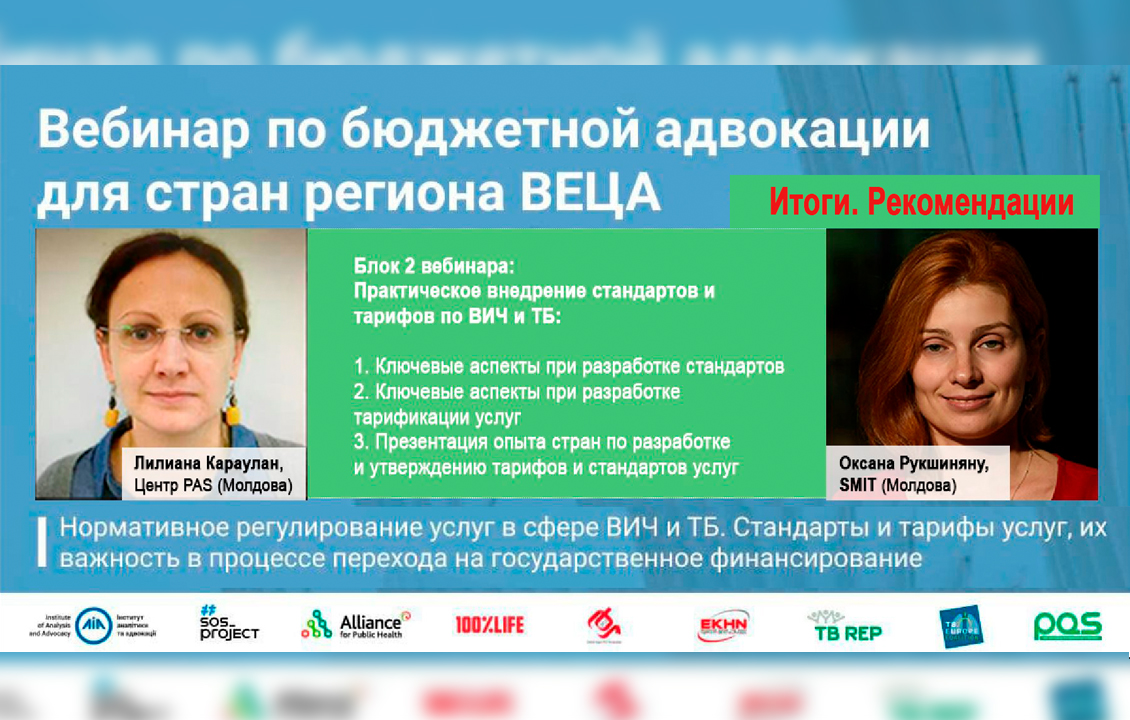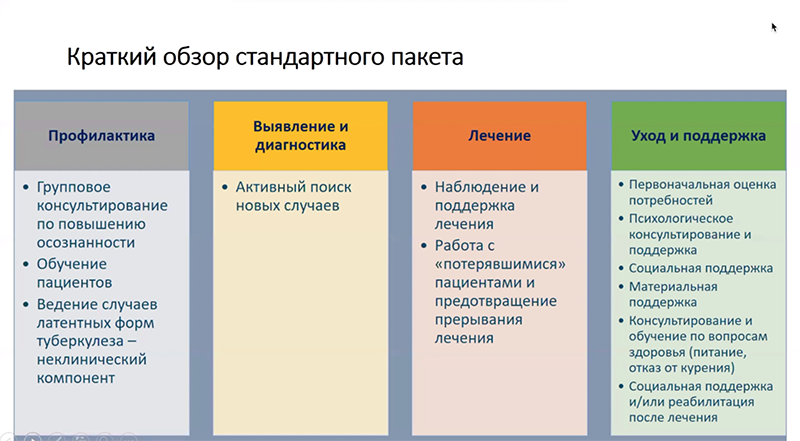
Liliana Karaulan, PAS Center, and Oksana Rukshinianu, the Moldovan Society against Tuberculosis, SMIT shared the experience of the TB-REP 2.0 multi-country team - theTB project in Eastern Europe and Central Asia and Moldova financed by the Global Fund - on the development and implementation of the standards and tariffs for TB services, in the context of transition to public funding within a special webinar on budget advocacy for the countries of the EECA region.
The event was attended by over 80 participants from the Eastern Europe and Central Asia. This was the second out of the 4 planned webinars, the theme of which was “HIV and TB Laws and Regulation. Service standards and tariffs, their importance in the process of transition to state funding”.
 Liliana Karaulan spoke about the standard package of TB community support services, which is being developed by the team of the TB-REP 2.0 regional project to help the countries of the EECA region.
Liliana Karaulan spoke about the standard package of TB community support services, which is being developed by the team of the TB-REP 2.0 regional project to help the countries of the EECA region.
“While the role of the nongovernmental sector in HIV is clear and the development of HIV service packages has progressed quite well in our countries, the TB response framework has only recently started to change. Many EECA countries are moving away from vertical health care models, in which the interventions were mainly carried out within TB services and inpatient care, to more coordinated people-centered models of care. We started to talk more about the importance of an integrated approach to TB care and treatment and of community involvement in the provision of supportive services,” said Liliana Karaulan. – "This is necessary to ensure that all the needs of key non-medical groups are met, because they are also a critical component of the TB detection and treatment outcomes."
Today there is a specific context in the formation of a package of TB support services. Firstly, she said, there has been an increase in demand for comprehensive services focused on the needs of people. And the increasing requirement to cover specific needs are the basis for reforming approaches to care and support for people with tuberculosis. This process implies a more active involvement of civil society in service delivery.
Secondly, in the context of the new GF financing model, countries in the region need to incrementally increase or restructure their investments in national TB responses. This will require the transition of a significant volume of services to the domestic funding. It is of vital importance to ensure the financial sustainability of HIV and TB programs for key populations, in accordance with the national regulatory framework during the transition period.
 Oksana Rukshinianu, the Moldovan Society against Tuberculosis - SMIT, spoke about the practical aspects of developing and approving the standards for TB services for NGOs on the example of Moldova. She stressed that both international approaches and local experience should be taken into account when developing such service packages. It is not enough to develop documents set solely on the national basis. The aspect of sustainability and adaptability of such service packages is also of great important.
Oksana Rukshinianu, the Moldovan Society against Tuberculosis - SMIT, spoke about the practical aspects of developing and approving the standards for TB services for NGOs on the example of Moldova. She stressed that both international approaches and local experience should be taken into account when developing such service packages. It is not enough to develop documents set solely on the national basis. The aspect of sustainability and adaptability of such service packages is also of great important.
“Civil society is an irreplaceable component of TB care. Governments need to develop and implement a system to ensure the sustainability of the services provided by NGOs,” said Liliana Karaulan.
Regardless of funding mechanisms and the type of contract between the government and NGOs, in order to ensure the process of launching services, the countries need a clear and consistent regulatory framework that will regulate, on the one hand, the process of providing the package of services, and on the other hand, the quality of services.
Ms Karaulan also noted that the task of the TB-REP 2.0 team is to provide countries with a tool for further adaptation and use in accordance with the specific needs of the country. This package will serve as a model for essential non-medical TB services that are delivered at the community level and include support services that are person-centered and aimed at improving TB treatment outcomes, taking into account the country context.
The concepts adopted by the TB-REP 2.0 team as a foundation for the development of the standard package of services are the following: focus on the needs of people at particular risk of TB; community-based service delivery; and comprehensive TB care that includes not only prevention, but also detection, diagnosis and treatment.

The standard package service description format includes:
Key success indicators of each service are different, the speakers noted, but the main ones are: the number of customers who received the service; the relationship between services in the TB care continuum (treatment cascade); quality of service delivery and cost per unit of service as an indicator of efficiency.
In addition to the package, the TB-REP 2.0 team is developing a costing methodology to provide national stakeholders with a practical tool for predicting the costs of community-based TB support services.

The standard service package and costing methodology developed by the TB-REP 2.0 team will need to be adapted by each country along the lines of the national service standards, regulations and procedures. And the more carefully and thoughtfully this process is carried out, the better these services will work.
Note that the next webinar will take place on December 1, 2020 and will be devoted to the topic of HIV and TB services financing by the national insurance companies. You can register for the webinar here https://forms.gle/HrWweo2D95m37tFL9. The webinar will be held on the ZOOM platform, a link to the meeting will be sent to the address specified during registration.
A series of budget advocacy webinars for NGOs from EECA, organized by the Institute for Analytics and Advocacy in partnership with the PAS Center and the European TB Coalition (ECTBC), within the SoS_project and TB-REP 2.0 regional projects funded by the Global Fund to Fight AIDS, tuberculosis and malaria.